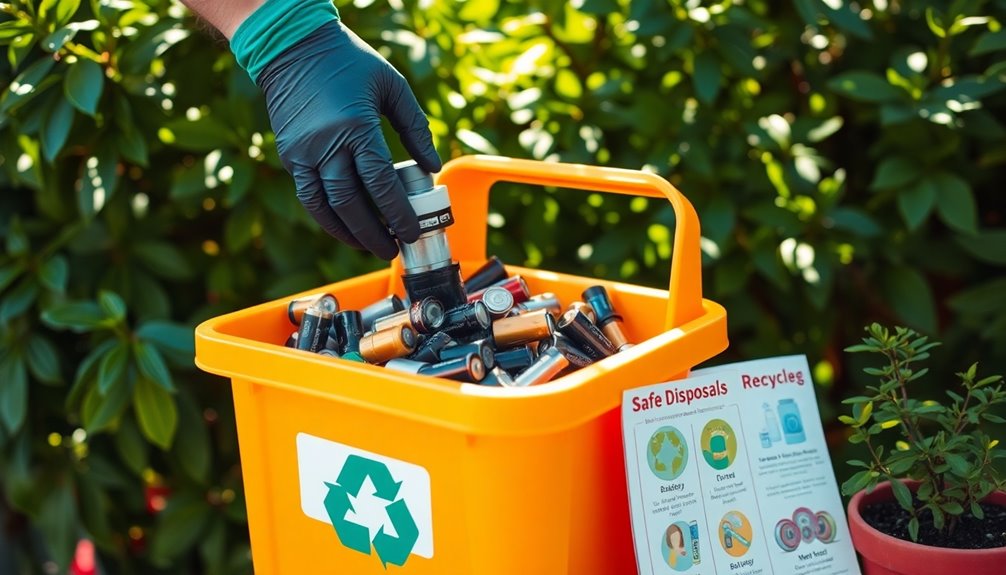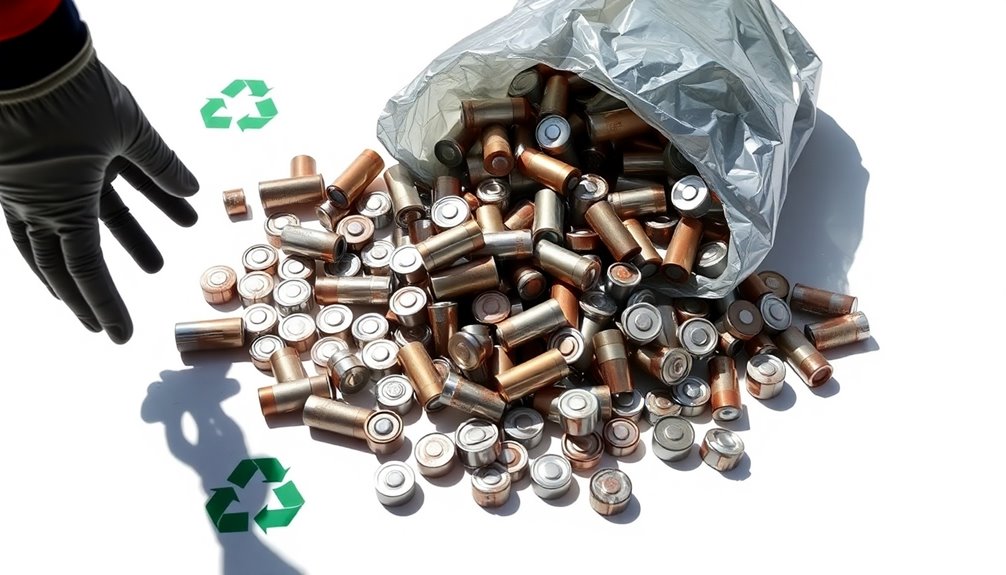To dispose of batteries safely, you've got to know the right methods. Collect your used batteries and store them in a secure, non-conductive container. For alkaline batteries, recycling is preferred, while lithium-ion and lead-acid batteries need special handling at designated recycling centers due to fire risks and hazardous materials. Many retailers, like Best Buy and Lowe's, offer drop-off programs. Attend local collection events or check your government's website for resources. Remember, improper disposal can harm the environment and lead to fines. There's plenty more to discover about safe disposal practices and where to take your batteries!
Key Takeaways
- Always recycle batteries through designated programs or facilities to prevent environmental harm and recover valuable materials.
- Store batteries in non-conductive containers and cover terminals to prevent short circuits and fire hazards during transport.
- Participate in local hazardous waste collection events for safe disposal and to keep your community informed about recycling practices.
- Use retailer take-back programs, such as those by Best Buy or Lowe's, for convenient and proper battery disposal.
- Check state-specific regulations on battery disposal, as some states classify all batteries as hazardous waste requiring special handling.
Importance of Proper Battery Disposal
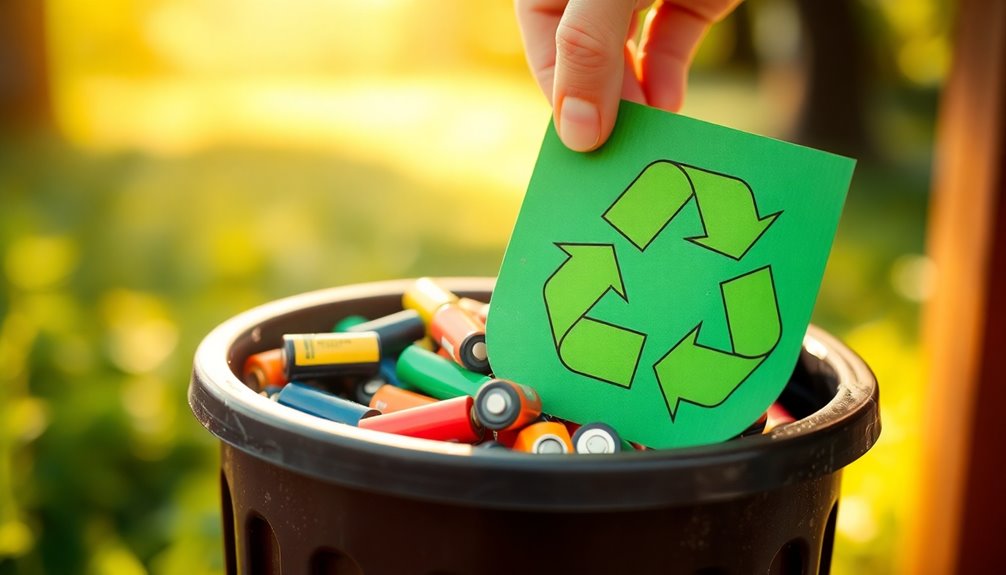
When you dispose of batteries improperly, you risk harming the environment and putting human health in jeopardy. Many batteries contain toxic materials like cadmium, lead, and lithium, which can leak into ecosystems, causing environmental contamination.
With approximately 180,000 tons of battery waste generated annually, proper disposal is vital. Participating in battery recycling programs not only recovers valuable materials but also reduces the need for raw material extraction, saving up to 90% of the energy required for new batteries.
Complying with local regulations regarding hazardous waste is essential to avoid legal penalties and protect wildlife. By understanding the risks associated with improper disposal, you can take steps toward responsible disposal, ensuring a safer environment for everyone.
Safe Storage Practices
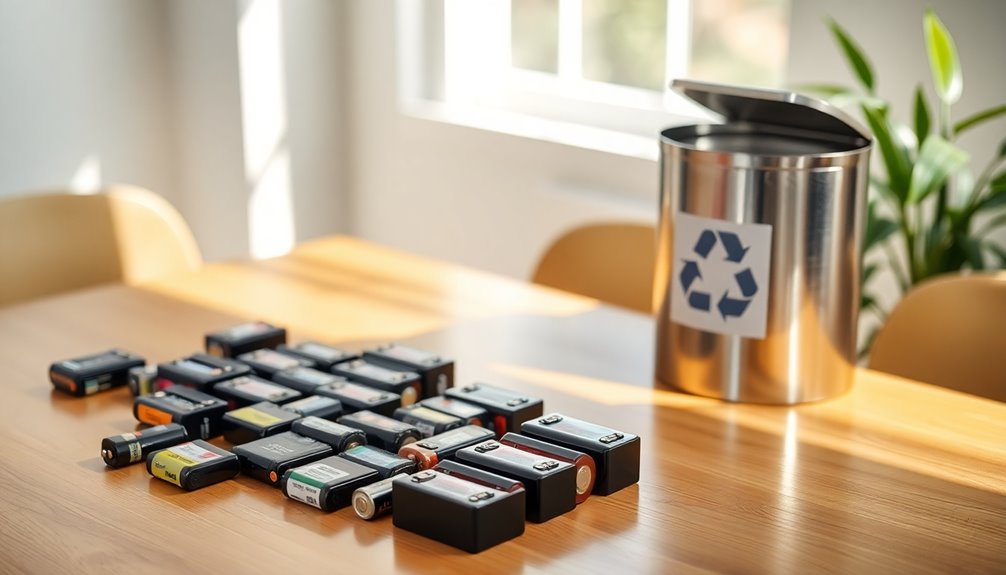
To keep your batteries safe, always store them in a secure container that prevents terminal contact.
Avoid placing them near conductive materials, as this can lead to dangerous situations.
Make sure to keep your storage in a cool, dry place to maintain the batteries' performance.
Secure Container Usage
Using a secure, non-conductive container is essential for safely storing batteries. This practice helps prevent contact between the positive and negative terminals, which can lead to short circuits and fire hazards.
Line up batteries side-by-side in the container to keep them organized and minimize accidental contact. It's a good idea to use tape to cover the battery terminals, especially for 9-volt types, as this reduces the risk of current flow during storage.
Make sure to keep your storage container in a cool, dry place, away from direct sunlight or extreme temperatures. Avoid placing it near metallic or conductive materials, as this can create dangerous conditions, increasing the chances of short-circuiting.
Avoid Conductive Materials
Avoiding conductive materials is essential for safe battery storage, as even a small oversight can lead to dangerous short circuits.
Store your batteries in a non-conductive container, like a plastic or cardboard box. Keep them lined up side-by-side, not stacked, to minimize the risk of terminals touching conductive surfaces.
Cover the positive and negative terminals, especially on 9-volt batteries, with electrical tape to prevent unintentional current flow.
Avoid placing batteries near metallic objects, such as keys or coins, which can create pathways for electrical discharge.
Proper Temperature Storage
While you may not think about it often, the temperature at which you store batteries plays a crucial role in their performance and lifespan. To guarantee safe battery storage, keep them in a cool, dry place at room temperature. Avoid direct sunlight; extreme temperatures can lead to leaks or hazardous situations.
Store batteries in their original packaging to protect terminals and prevent accidental contact. Use a non-conductive container and line batteries up side-by-side to minimize risks. For extra safety, cover the positive and negative ends with tape to reduce the chance of accidental discharge.
| Temperature Range | Recommended Storage Practice | Safety Tip |
|---|---|---|
| Below 32°F | Avoid storing | Risk of freezing |
| 32°F to 80°F | Ideal conditions | Best performance |
| 80°F to 100°F | Limit exposure | Check for swelling |
| Above 100°F | Discard immediately | Hazardous situation ahead |
| Extreme Heat | Avoid at all costs | Risk of leakage |
Types of Batteries and Their Disposal
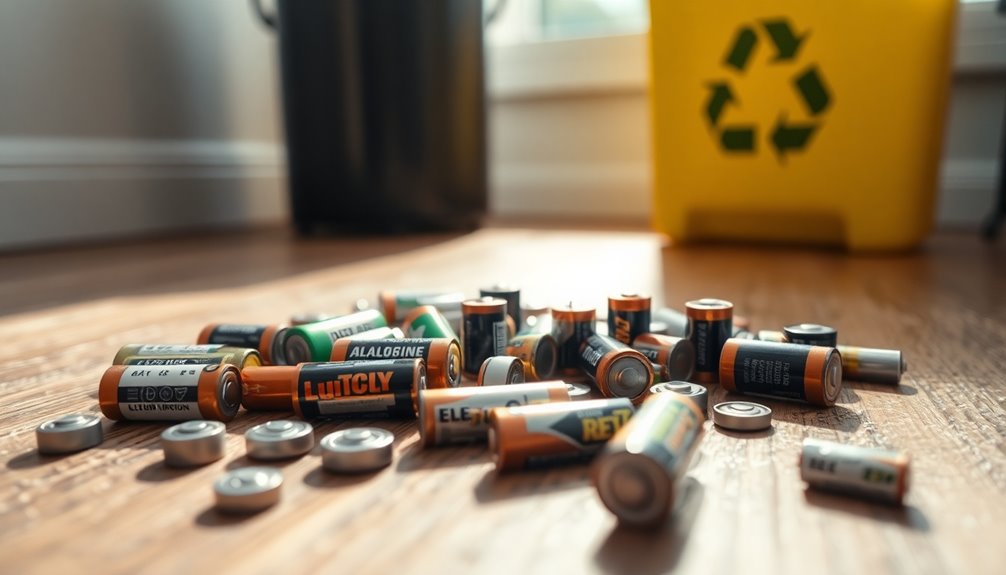
Understanding the different types of batteries and their disposal methods is essential for protecting the environment.
Alkaline batteries, commonly found in your home, should be recycled rather than thrown away, especially in California.
Lithium-ion (li-ion) batteries, often in electronics, require special disposal at designated recycling facilities due to fire risks.
Lead-acid batteries, used in vehicles, must be recycled because of their toxic lead content; many auto retailers accept used car batteries for safe disposal.
Nickel-cadmium batteries, found in power tools, also need careful handling due to carcinogenic cadmium.
Finally, types of rechargeable batteries are eco-friendly and can often be recycled through programs like Call2Recycle, which provide convenient household hazardous waste collection points for safe disposal.
Risks of Improper Disposal
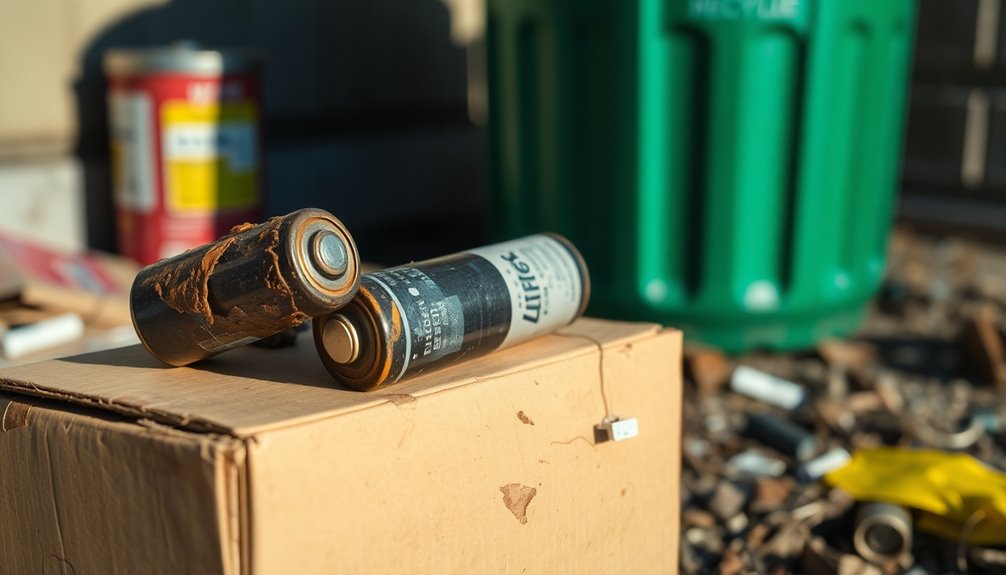
Improperly disposing of batteries can have serious consequences for both the environment and public safety. When you throw batteries in the trash, they can leak toxic materials like lead and cadmium into the soil and groundwater, leading to significant environmental contamination.
Additionally, old batteries may still pose fire hazards; if they short-circuit, they can ignite and cause dangerous fires. Regulatory fines for illegal battery disposal can also reach thousands of dollars, highlighting the importance of proper battery disposal.
Annually, an estimated 180,000 tons of battery waste contribute to landfill overload, increasing toxic chemical exposure in ecosystems. To protect wildlife and natural habitats, consider using recycling centers for battery recycling instead of risking hazardous waste with improper disposal.
Recycling Options
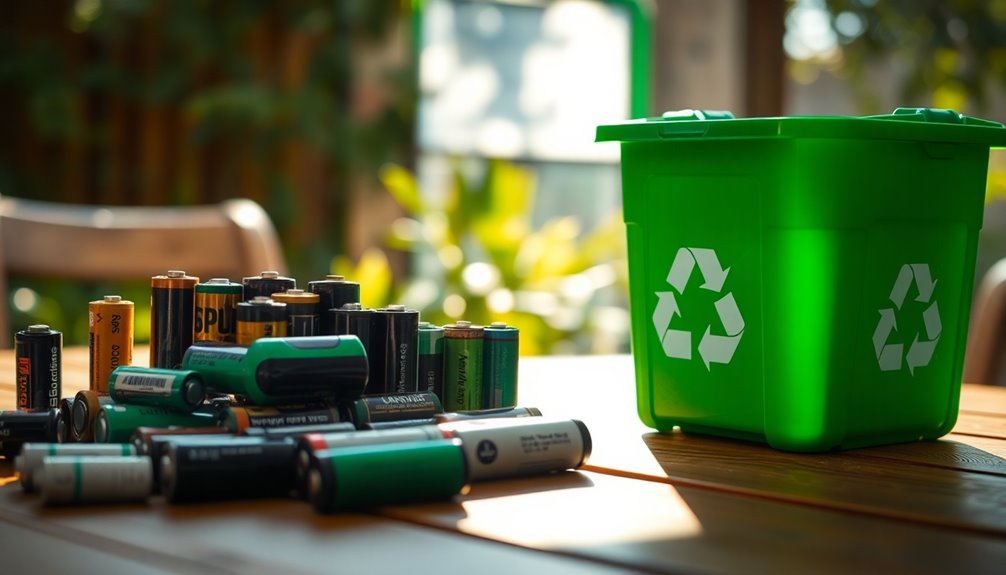
When it comes to recycling your batteries, you've got plenty of options.
Many retailers like Best Buy and Lowe's offer convenient drop-off programs, making it easy for you to dispose of used batteries properly.
Additionally, local collection events often pop up in your community, providing a great opportunity to recycle and learn more about safe disposal methods.
Retailer Recycling Programs
Many major retailers make it easy for you to recycle batteries responsibly through dedicated recycling programs. Stores like Best Buy, Lowe's, and Staples offer convenient disposal options for various battery types, including rechargeable batteries like lithium-ion and nickel-cadmium.
You'll find collection bins specifically designed for these batteries, ensuring proper recycling and minimizing hazardous waste. Some retailers even implement exchange programs, allowing you to recycle your old batteries when buying new ones, promoting responsible disposal practices.
Additionally, many auto retailers accept lead-acid batteries, which require special handling due to their hazardous materials.
Local Collection Events
While retailer recycling programs offer convenient options for battery disposal, local collection events provide another effective way to safely recycle batteries in your community. Municipalities often organize these events, allowing residents to dispose of batteries on specific days. Many communities host hazardous waste collection events annually or bi-annually, ensuring proper disposal of batteries alongside other hazardous materials. You can check your local government website for schedules and accepted battery types.
| Event Type | Description |
|---|---|
| Local Collection Events | Designated days for battery recycling |
| Hazardous Waste Collection | Accepts batteries with hazardous materials |
| Community-Driven Drives | Local groups raising awareness |
| Environmental Impact Awareness | Reduces battery waste in the community |
Participating in these events helps promote responsible disposal and reduces environmental impact.
Safe Disposal Methods
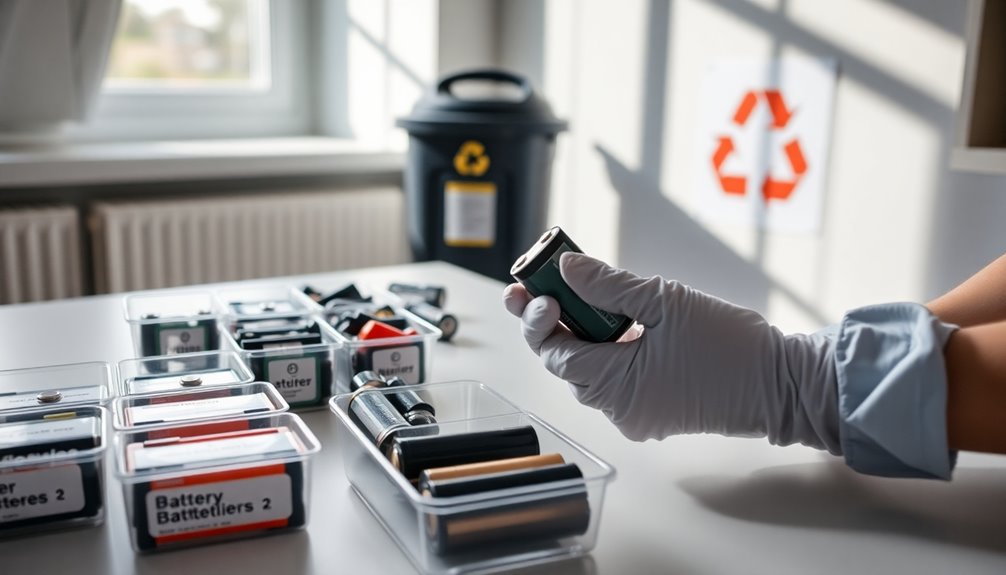
Properly disposing of batteries is essential for protecting the environment and your community. Always recycle batteries at designated drop-off locations or through retailer take-back programs to prevent environmental contamination.
Use tape to cover the terminals of batteries, especially 9-volt ones, to avoid short-circuiting during transport. Participate in community hazardous waste collection events, which often include specific days for safe battery disposal.
For lithium-ion batteries, consider utilizing mail-in recycling programs that provide kits for safe collection and transport. Familiarize yourself with your state's disposal requirements, as some classify all battery types as hazardous waste, necessitating recycling at authorized facilities.
Resources for Battery Disposal
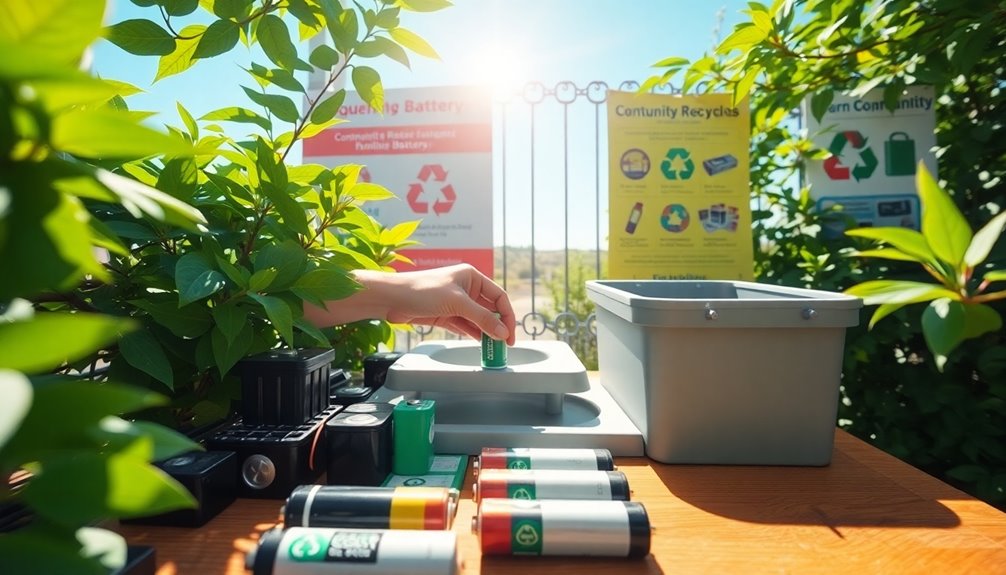
When it comes to finding resources for battery disposal, you'll discover a variety of options available to help you recycle responsibly. Your local government's website is a great starting point, often listing recycling facilities and guidelines for proper battery disposal.
Organizations like Call2Recycle and Earth911 provide online resources to help you locate nearby drop-off points for battery recycling. Many retailers, such as Best Buy, Lowe's, and Staples, run battery recycling programs where you can safely dispose of used batteries.
Additionally, community programs frequently organize special recycling events to guarantee convenient disposal options. Finally, educational resources from environmental organizations can enhance your understanding of safe disposal practices and the importance of recycling for a healthier planet.
Frequently Asked Questions
How to Dispose of AA Batteries at Home?
When you need to dispose of AA batteries at home, first check your local regulations.
In some areas, you can toss alkaline batteries in the trash, but recycling is often a better option. Look for designated drop-off locations or retailer programs like those at Best Buy or Home Depot.
If you have 9-volt batteries, tape the terminals to prevent short-circuits.
For rechargeable batteries, find a recycling facility to guarantee safe disposal.
Is It Safe to Put AA Batteries in the Bin?
You wouldn't toss your smartphone in the bin, so why would you do the same with AA batteries?
It's not safe to put them in the trash. Many areas have strict regulations against it. Instead, recycle them through designated programs or local collection events.
This helps prevent soil and water contamination. Always check your local guidelines to avoid fines and guarantee you're disposing of them responsibly.
Your actions can make a difference!
How Do I Dispose of AA Batteries in Maryland?
To dispose of AA batteries in Maryland, you can't just throw them in the trash.
Instead, take them to designated recycling centers or participate in special collection events. Many retailers like Best Buy and Home Depot offer battery recycling programs too.
Before you head out, remember to tape the terminals to prevent short-circuiting.
For additional options, check the Maryland Department of the Environment's website for local drop-off sites.
Can You Throw Away Alkaline Batteries in Texas?
Yes, you can throw away alkaline batteries in Texas, but it's smart to recycle them instead.
Even though they're considered non-hazardous waste, local regulations might vary, so check your area's guidelines.
Many retailers and recycling centers accept alkaline batteries, making it easy to dispose of them responsibly.
Recycling not only helps reduce landfill waste but also conserves valuable natural resources, so it's a win-win for you and the environment!
Conclusion
In summary, disposing of batteries properly is essential for both your safety and the environment. Did you know that around 180 million rechargeable batteries are sold in the U.S. each year, yet only about 5% are recycled? By following safe disposal methods and utilizing available recycling options, you can help reduce hazardous waste and conserve valuable resources. Remember, your actions matter—make sure to handle battery disposal responsibly!

